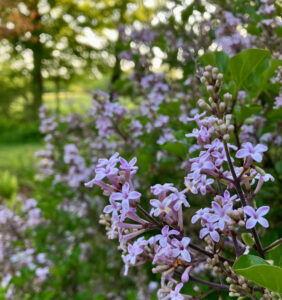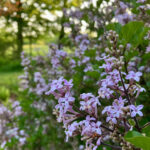 Lilacs are flowering everywhere in the Berkshires now — in front yards, along the roadside, in a fallow field where a house once stood. Though seemingly delicate and fragile, lilacs are quite hardy and can live well into their seventh decade. Every spring, their blossoms fill the air with a potent fragrance that’s infused with longing — the mixture of “memory and desire” T. S. Eliot wrote about in the Wasteland. What is it about the sense of smell — the strongest of the human senses — that can transport us so quickly into the past? Lilac was the signature scent of an elderly aunt — a stern, accomplished pianist who brooked no nonsense —who returns to me every spring with the first whiff of syringa vulgaris. Lilac. The name itself is lovely, with those two gentle vowels nestled in the arms of the three protective consonants. The roots of the lilac are sunk deep into the heart of American poetry, with Walt Whitman’s elegy on the death of Abraham Lincoln the most famous. This long, glorious poem which, like so much of Whitman, contains multitudes – the planet Venus, the hermit thrush, the Civil war, mourning, death, and “ever returning spring” — to name just a few. Here are the poem’s first and final verses.
Lilacs are flowering everywhere in the Berkshires now — in front yards, along the roadside, in a fallow field where a house once stood. Though seemingly delicate and fragile, lilacs are quite hardy and can live well into their seventh decade. Every spring, their blossoms fill the air with a potent fragrance that’s infused with longing — the mixture of “memory and desire” T. S. Eliot wrote about in the Wasteland. What is it about the sense of smell — the strongest of the human senses — that can transport us so quickly into the past? Lilac was the signature scent of an elderly aunt — a stern, accomplished pianist who brooked no nonsense —who returns to me every spring with the first whiff of syringa vulgaris. Lilac. The name itself is lovely, with those two gentle vowels nestled in the arms of the three protective consonants. The roots of the lilac are sunk deep into the heart of American poetry, with Walt Whitman’s elegy on the death of Abraham Lincoln the most famous. This long, glorious poem which, like so much of Whitman, contains multitudes – the planet Venus, the hermit thrush, the Civil war, mourning, death, and “ever returning spring” — to name just a few. Here are the poem’s first and final verses.
When Lilacs Last in the Dooryard Bloom’d
by Walt Whitman
1
When lilacs last in the dooryard bloom’d,
And the great star early droop’d in the western sky in the night,
I mourn’d, and yet shall mourn with ever-returning spring.
Ever-returning spring, trinity sure to me you bring,
Lilac blooming perennial and drooping star in the west,
And thought of him I love.
………
16
Passing the visions, passing the night,
Passing, unloosing the hold of my comrades’ hands,
Passing the song of the hermit bird and the tallying song of my soul,
Victorious song, death’s outlet song, yet varying ever-altering song,
As low and wailing, yet clear the notes, rising and falling, flooding the night,
Sadly sinking and fainting, as warning and warning, and yet again bursting with joy,
Covering the earth and filling the spread of the heaven,
As that powerful psalm in the night I heard from recesses,
Passing, I leave thee lilac with heart-shaped leaves,
I leave thee there in the door-yard, blooming, returning with spring.
I cease from my song for thee,
From my gaze on thee in the west, fronting the west, communing with thee,
O comrade lustrous with silver face in the night.
Yet each to keep and all, retrievements out of the night,
The song, the wondrous chant of the gray-brown bird,
And the tallying chant, the echo arous’d in my soul,
With the lustrous and drooping star with the countenance full of woe,
With the holders holding my hand nearing the call of the bird,
Comrades mine and I in the midst, and their memory ever to keep, for the dead I loved so well,
For the sweetest, wisest soul of all my days and lands—and this for his dear sake,
Lilac and star and bird twined with the chant of my soul,
There in the fragrant pines and the cedars dusk and dim.



The lilacs are in their waning days for this season, here in Maine. So short-lived, so fleeting, so beautiful.
Thanks, Cheryl. Always get to hear from you!
Here in eastern PA the lilacs came on quickly with early heat and passed too soon. Now we are bathed in the scent of mock orange and the grape jelly smell of the iris.
I love “the grape jelly smell of the iris.” So nice to hear from another Liza.
When lilacs bloom in NYC one can count on migrating bluefish returning to our waters after their trip to warmer waters in the fall. I find the link between lilacs and bluefish an intriguing moment to see the larger cycles of nature.
When I was a child the lilac bloom signaled the presence of mackerel in our waters which bluefish followed as it was a major source of food in the spring. Unfortunately, mackerel populations have plummeted so there is no longer any real run of mackerel.
Fascinating to hear about the lilac bloom and bluefish return, Roger. How beautifully coordinated nature is; I learn something new from her every day.
Lilacs to me in childhood signaled the end of the school year and freedom. Their scent was a bonus.
Thanks, Patty. Lilacs are so freedom loving — spilling over with perfume and color. They don’t last long in a vase though — I think they’re best enjoyed in the wild.
Barry, AWOTC
This Whitman fellow has quite a way with words.
I too love the lilac, they are nice to have near an open window.
Pithy and profound, as always, AWOTC.
Liza. Lilacs are amazing. This year for the first time we saw that our lilacs had jumped across the road and were blooming away over there. Didn’t realize how big they were either. Surprise!
Lovely poem too and we’ve also been seeing the drooping star in the west. Venus I presume along with the lilacs.
Yes, Margie, I think the lilacs really thrived in the long wet chilly spring we had — and can’t seem to leave behind!